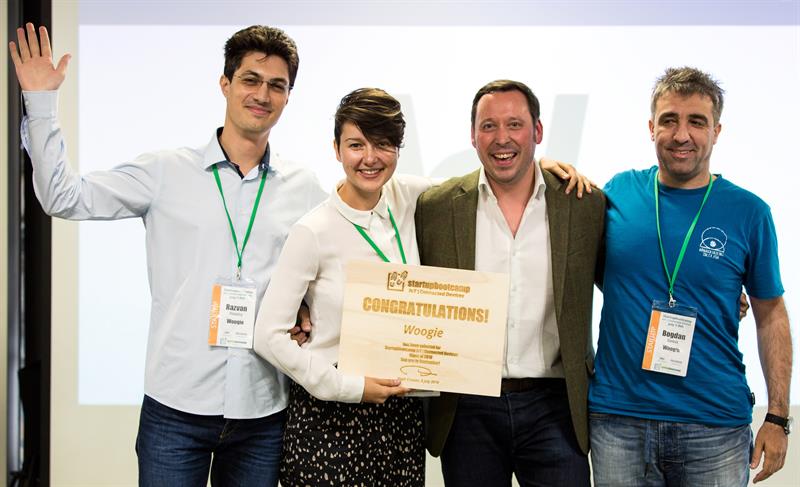“Startupbootcamp supports startups in their early stages to help them get to scale and we’re looking specifically into vertical markets,” Raph Crouan, managing director of the London IoT hardware programme, explained.
Following a selection process, the IoT hardware programme recently announced the 10 startups that will join the first cohort of its London-based programme. The programme looks specifically for companies developing connected devices. On the consumer side, it looks for projects addressing smart homes, smart energy, next-generation wearables, and health and well-being, amongst others. Potential industrial applications range from smart manufacturing and smart energy to smart agriculture.
The latest programme received 425 applications from 61 countries and 21 of them were invited to the selection days. The final 10 were chosen following a three-day selection process, including expert workshops, pitches to programme partners such as Cisco, DLL and Premier Farnell, and mentor feedback sessions.
Crouan said: “The programme lasts for three months and is really intense. It’s a very short time for a hardware company to deliver and they need to work hard to be ready to present themselves in front of 500 investors at the end.”
What are the benefits for the startups?
“They get €15,000 of funding, direct access to and support from an international network of mentors, partners and investors in their industry and free office space in London, with a prototyping lab,” Crouan added. At the end of the three months, there will be a public demo day, when each of the startups will pitch in front of potential investors.
Three of the successful startups – Woogie, ThingTrax and Doordeck – agree that Startupbootcamp has already helped them, even though they haven’t yet entered the programme.
Romanian company Woogie is building a robot which functions as a learning companion for children. Founder Bogdan Coman said: “At the selection days, we came across mentors, professionals and young entrepreneurs like us – all full of energy, helping us with invaluable feedback.” Coman added that its involvement in the programme has brought Woogie closer to its target market of English-speaking countries.
Surrey based Doordeck is working on a hardware and software product for controlling electronic locks. “The market has been flooded with smartlocks in the last couple of years, but we’re not a smartlock,” said Michael Barnwell, CTO. “We made a hardware module to work with any electronically controlled lock." Barnwell claimed the selection days made him reflect on and re-evaluate some decisions. “Having the Startupbootcamp brand behind us also made our friends and family investors feel more confident and made recruitment easier.”

Winning team, Woogie, with the London programme's managing director, Raph Crouan (second from the right)
What does Startupbootcamp look for in an IoT startup?
According to Crouan: “We look for three things. First, does it deal in the markets we are interested in? Second, the teams need to have a minimum of two co-founders; we want to make sure there are complementary set of skills in the teams we select. Third is the team itself – the company’s success depends on it.”
At the beginning of the selection process, an independent mediator works with the co-founders of the companies to determine whether their expectations are realistic.
Crouan believes that lack of communication and planning are one reason why 70% of young companies fail. Another reason is timing. “Sometimes, it’s either too early or too late,” he added.
However, startupbootcamp says it has an 80% success rate and that 73% of the selected startups get funded every year from investors met on the programme.
“On average, a startup takes between five to eight years to be successful on an exit-strategy,” Crouan said. “We are about six years old, so we are probably looking at five to ten of our startups being really successful in the next three years.”
Crouan has also noticed that entrepreneurs are getting older. “The average age of our founders is close to 32 to 35, which brings a completely different dynamic to the programmes because people are more connected and have a better understanding of what they want to do. That makes the programme more interesting and more promising.”
This is the case for UK based ThingTrax, whose co-founders Imran Shafqat and Aman Bindal have a strong Microsoft development and consulting background and have worked on several IoT and Azure projects. “We were introduced to a plastic moulding contract manufacturer in India, where we observed that the use of several types of machines each having sensors and devices supplied by various vendors made it extremely hard to track, monitor, report and control the manufacturing process,” they said.
This prompted them to develop a monitoring device which connects to both new and legacy injection moulding machines and sensors, capturing and storing machine and operator information in the cloud.
The next startup to take place in London focuses on technology in the insurance industry. For more details, go to www.startupbootcamp.org/accelerator/insurtech-lond...






